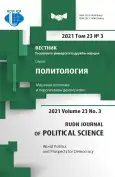The Challenges of Future Leadership in International Affairs
- Authors: Hrabina J.1
-
Affiliations:
- MGIMO University
- Issue: Vol 23, No 3 (2021): World Politics and Prospects for Democracy
- Pages: 407-423
- Section: WORLD POLITICS AND GLOBAL LEADERSHIP
- URL: https://journal-vniispk.ru/2313-1438/article/view/322569
- DOI: https://doi.org/10.22363/2313-1438-2021-23-3-407-423
- ID: 322569
Cite item
Full Text
Abstract
The article deals with the structural shifts towards multipolarity and global changes such as climate change, Industrial Revolution 4.0 and pandemics as phenomena that will shape the future generation of political leaders. The author works with neoclassical realism as a primary paradigm that enables him to evaluate structural shifts and the quality of political establishment on the unit level. The article entails both qualitative and quantitative methods. The Composite Index of National Capability and the comparison of gathered data falls into the quantitative methods, while analysis of scientific literature is the qualitative research method. The article’s primary aim is to determine the scope of the current challenges for future political leaders. The paper’s central argument formulates the hypothesis that future leaders will be vastly shaped by the shift towards multipolarity in which the balance of power logic drives international affairs. At the same time, the future political thinkers are about to deal with the global emergencies caused by climate crisis, pandemics and Industrial Revolutions 4.0 and 5.0.
About the authors
Jozef Hrabina
MGIMO University
Author for correspondence.
Email: Hrabina.consulting@gmail.com
ORCID iD: 0000-0003-4335-2172
Postgraduate of the Department of Applied International Analysis; Visiting Lecturer of the School of Government and International Affairs
Moscow, Russian FederationReferences
- Acharya, A. (2018). The end of American world order. Cambridge (GB): Polity Press.
- Allison, G.T. (2020). Destined for war can America and China escape Thucydides’s trap? Melbourne: Scribe.
- Bristow, J. (2020). Post-Brexit boomer blaming: The contradictions of generational grievance. The Sociological Review, 69(4), 12-24, doi: 10.1177/0038026119899882
- Bull, H., & Watson, A. (2020). The expansion of international society. Oxford: Oxford University Press.
- Bull, H., Hoffmann, S., & Hurrell, A. (2012). The anarchical society a study of order in world politics. New York: Palgrave.
- Dahl, R.A. (1959). The concept of power. Indianapolis: The Bobbs-Merrill comp.
- Doyle, M. (1996). Liberalism and World Politics. The American Political Science Review, 80(4), 1151-1169. doi: 10.2307/1960861
- Fukuyama, F. (1989). The end of history and the last man. London: Penguin Books.
- Ikenberry, G. (2014). Power, order, and change in world politics. Cambridge University Press.
- Ikenberry, G. (2018). The end of liberal international order?, International Affairs, 94(1), 7-23, https://doi.org/10.1093/ia/iix241
- Gerring, J., Oncel, E., Morrison, K., & Pemstein, D. (2019). Who rules the world? A portrait of the global leadership class. Perspectives on Politics, 17(4), 1079-1097. https://doi.org/10.1017/ s1537592719000744
- Higley, J. (n.d.). Elites. In Encyclopedia Britannica. Retrieved May 13, 2021, from https://www.britannica.com/topic/elite-sociology
- Kissinger, H. (2005). Diplomacy. Simon & Schuster.
- Lasswell, H.D., & Lerner, D. (1980). World revolutionary elites studies in coercive ideological movements. Westport, CT: Greenwood Press.
- Lebedeva, M. (2007). World politics. Moscow: Aspect Press. (In Russian)
- Lo, B. (2015). Russia and the new world order. London: Chatham House.
- Mearsheimer, J.J. (2014). The tragedy of great power politics. New York: W.W. Norton & amp; Company.
- Mearsheimer, J.J. (2018). Great Delusion: Liberal Dreams and International Realities. Yale University Press.
- Miller, E., Gusmano, M., & Jones, D. (2018). Aging policy in the Trump era. Innovation in Aging, 2, 630-630. 10.1093/geroni/igy023.2351.
- Monteiro, N.P. (2012). Unrest assured: Why unipolarity is not peaceful. International Security, 36(3), 9-40. doi: 10.1162/isec_a_00064
- Morgenthau, H.J., & Thompson, K.W. (2018). Politics among nations: The struggle for power and peace. New Delhi: Kalyani.
- Pleyers, G. (2010). Alter-globalisation: Becoming actors in a global age. Cambridge: Polity Press.
- Podesta, J. (2019). The climate crisis, migration, and refugees. Retrieved November 29, 2020, from https://www.brookings.edu/research/the-climate-crisis-migration-and-refugees/
- Rosencrance, R. (1966). Bipolarity, multipolarity, and the future. Journal of Conflict Resolution, 10(3), 314-327.
- Singer, J.D., Bremer, S., & Stuckey, J. (1972). Capability Distribution, Uncertainty, and Major-Power War, 1820-1965. In Peace, War and Numbers. M. Beverly Hills: Sage.
- Schwab, K. (2018). The Fourth industrial revolution (Industry 4.0) A social innovation perspective. Tạp Chí Nghiên Cứu Dân Tộc, (23). doi: 10.25073/0866-773x/97
- Soh, C., & Connolly, D. (2020). New frontiers of profit and risk: The Fourth industrial revolution’s impact on business and human rights. New Political Economy: 1-18. https://doi.org/ 10.1080/13563467.2020.1723514
- Steger, M., & Wilson, E. (2012). Anti-globalization or alter-globalization? Mapping the political ideology of the global justice movement. International Studies Quarterly, 56(3), 439-454. Retrieved November 30, 2020, from http://www.jstor.org/stable/23256797
- Turner, S. (2009). Russia, China and a multipolar world order: The danger in the undefined. Asian Perspective, 33(1), 159-184. Retrieved May 13, 2021, from http://www.jstor.org/stable/42704667
- Waltz, K. (1979). Theory of International Politics. Columbia University. Waveland Press
- Wendt, A. (1999). Social theory and international politics. Cambridge: Cambridge University Press
- Wilkoszewski, H., Loichinger E., & Dick (2016). Turning the tables: policy and politics in an age of ageing. Population & Policy Bites, Blog post, 18 October 2016
- Wohlforth, W.C. (1999). The Stability of a Unipolar World. International Security, 21(1), 5-41
Supplementary files









